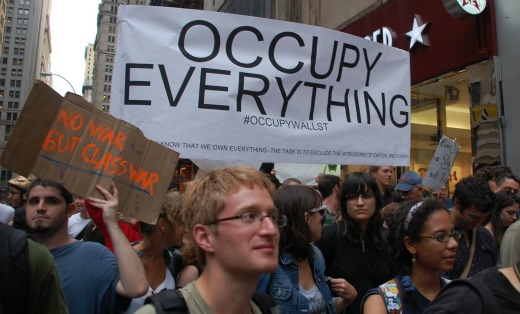
Angry about Wall Street greed and rejecting lawmakers they say have been purchased by big corporations, the Occupy Wall Street movement is spreading rapidly across the nation.
Today is the twelfth day that Occupy Chicago members have claimed their territory outside the Windy City’s Federal Reserve Bank and the Board of Trade. The demonstrators carry on in rotating shifts because the city is not allowing them to sleep on the sidewalk.
People have already been gathering in Maryland to plan Occupy Baltimore and, in Philadelphia, 400 people have turned up at the United Methodist Church for the first gathering of Occupy Philly, a demonstration/camp-in to show solidarity with the protests in New York.
On Day 2 of Occupy Seattle, the number of tents doubled overnight to 31.
Occupy Boston features tents, medical supplies and wi-fi in Dewey Square, opposite the Federal Reserve Building. More than 1,000 have been gathering there where protesters have formed groups that specialize in legal affairs, food gathering and media outreach.
Starting Oct. 6, a group called October 2011, is expected to begin an occupation by thousands of Freedom Plaza, in Washington D.C. The “occupiers” in that action plan to hold a Peoples Assembly that will draft solutions to the economic crisis, including creation of millions of good green jobs.
Unions, one after the other, are joining the protests, in the midst of organizing a week of national actions for good jobs, Oct. 10-15, including a march for jobs in Washington, DC, Oct. 15.
Community groups and unions in Oakland and San Francisco rallied last week demanding banks take responsibilit for their role in the economic crisis.
On Monday afternoon, in New York, the Transport Workers Union, Local 100, went to court to ask for an injunction to stop the New York Police Department from requiring city bus drivers to transport arrested Occupy Wall Street demonstrators.
On one day alone, last Saturday, police arrested 700 demonstrators on the Brooklyn Bridge.
“We’re a pretty mainstream blue-collar union,” said Local 100 spokesman Jim Gannon. “We view the protests as young people articulating the same kind of things that we’ve been trying to articulate.”
The TWU was one of the first unions to back the movement, and will march with the protesters Wednesday afternoon.
“They’ve really thrown a spotlight on issues that are bothering workers like our members,” said Gannon. “Right now we’re deciding how we’re going to give them material support, and what we should do for them.”
Police brutality documented on videos that have gone viral and the mass arrests have, most observers note, helped the protests capture the attention of the nation and are causing them to grow.
As the list of protests breaking out in other cities grows, the encampment in New York’s financial district gets larger and larger.
“It’s so thrilling,” said Van Jones, the former Obama adviser and a founder of the American Dream Movement, speaking at a conference in Washington this week. The protesters, he said, “are calling the conscience of America back to the economic catastrophe. Nobody has been able to do that.”
The labor movement sees the protests as a grassroots uprising against austerity economics. Among the unions marching Wednesday, in addition to the TWU, are the Steelworkers, the United Federation of Teachers, the Service Employees International Union and the National Writers Union.
MoveOn.org is sending out e-blasts in support of the marches. MoveOn has focused, over the last several months, on many issues related to Wall Street greed.
From the website “OccupyWallStreet,” the movement calls itself a “leaderless resistance movement with people of many colors, genders and political persuasions. The one thing we all have in common is that We Are The 99% that will no longer tolerate the greed and corruption of the 1%.”
They also draw inspiration from Egypt’s Tahrir Square and other Arab democracy movements.
“We are using the revolutionary Arab Spring tactic to achieve our ends and encourage the use of nonviolence to maximize the safety of all participants.”
Teresa Albano contributed to this story.
Photo: Thomas Good/NLN












Comments